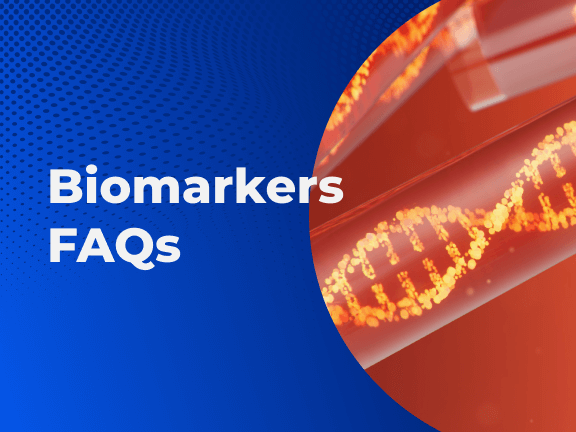Biomarkers Frequently Asked Questions
With biomarkers helping in developing specific drugs to treat certain types of cancer, the medical world considers them extremely important. The advancements in immunohistochemistry (the method where antibodies are used to identify the presence of certain types of antigens in a sample of tissue), they can now better investigate how to best benefit them through clinical trials. In this article, we will go over the most common questions about biomarkers.
What Is a Biomarker?
Biomarkers are measurable medical indicators of biological changes at a molecular level. And cancer biomarkers, also called tumor markers, are the traces of a patient’s tumor/cancer leaves behind. These traces are unique indicators of certain tumors. That is how biomarkers are useful in determining the patient’s type of cancer, its stage, risk of developing cancer, and if a specific type of treatment will work on them or not.
What Are the Four Types of Biomarkers?
The main categorization of cancer biomarkers is based on the type of tumor, which is listed as circulating tumor markers and tumor tissue markers. However, since biomarkers might be defined as traces of various changes the body goes through, there is a larger categorization that classifies biomarkers in general and it has four types:
- Molecular biomarkers: They have biophysical features that can be measured in samples such as related plasma, fluid or biopsy.
- Histologic biomarkers: These are microbiological biomarkers that are investigated in a tissue sample under a microscope.
- Radiographic biomarkers: Also called imaging biomarkers are biological characteristics that can be identified in an image. The radiographic biomarkers are generally the first step in diagnosing. The stain that is visible in a lung X-ray is an example.
- Physiologic biomarkers: These are indicators of the metabolic status of the body. Heart rate and blood pressure can be listed as examples.
How Many Cancer Biomarkers Are There?
There are more than 70 cancer biomarkers, and thanks to scientists, their numbers are increasing every day.
What Is the Importance of Biomarkers in Cancer?
Biomarkers created a tremendous change in how cancer is treated. The traditional methods would approach all types of cancer the same. With the involvement of biomarkers in the diagnosis, the medical teams had the chance to evaluate the differences not only between cancer types or stages but also between patients suffering from the same type of cancer. This allowed them to estimate prognosis and design specific treatment plans targeting cancer at a molecular level. The biomarkers also help scientists develop precision medicine, which is designed for the patient’s specific needs, rather than a standard medicine that targets the general population. Biomarkers also help doctors identify the risk of cancer beforehand. For example, the presence of BRAC1 and BRAC2 mutations shows the patient has a higher risk of developing breast, ovarian, or prostate cancer. And if medical advancement provides the possibility, precision medicine can be designed to prevent cancer as well.
What Is Biomarker Testing in Cancer?
Biomarker testing is a medical investigation of genes, proteins, or other substances to see if there are changes in any of them linked to cancer. There are two main types of biomarker testing methods: a biopsy (for solid tumors) and a blood draw (for blood cancer).
Biomarker testing can have more than one goal:
- Identifying the DNA sequencing – through genomic testing
- Identifying gene fusions – thorough DNA or RNA tests
- Identifying protein levels – RNA assessment tests
Biomarker testing is also referred to by other names such as tumor testing, tumor genetic testing, genomic testing/profiling, molecular testing/profiling, somatic testing, and tumor subtyping.
How Can a Biomarker be Identified?
The sample collected from the patient’s tumor or blood in case of blood cancer is sent to the laboratory to be analyzed. The laboratory runs pathological testing and molecular testing on the samples to see if a specific biomarker exists, and at what level. The tests might be carried out to analyze just one biomarker, or for many different ones. If a genetic change is investigated, laboratory analysis is done in comparison with the healthy tissue sample taken from the same patient.
Biomarkers in Clinical Trials
Biomarkers have become a central point for clinical trials as they bring a chance to create targeted therapies and drugs specific to each patient. Immunotherapy-focused clinical trials try to understand the relationship between the patients’ biomarker and their immune system reaction for certain immunotherapies. Some studies focus on unlocking the risk factor indicated by some biomarkers for some types of cancer. And other clinical trials are trying to find out how the body responds to the applied therapy through observing the biomarkers. With its cancer-focused approach, Massive Bio helps cancer patients get access to clinical trials all over the world. Through our free AI matching services, you can find a trial that studies your cancer. Feel free to get a free consultation and take just 2 minutes for the online assessment to explore your clinical trial options.
Sources:












